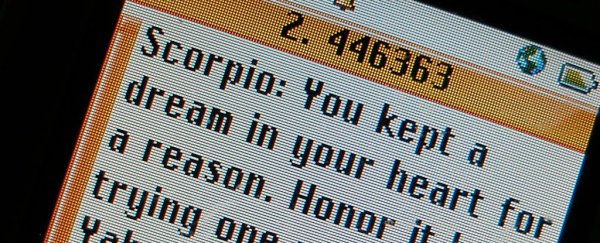A hospital in Buenos Aires is offering patients in its mental health department a workshop called "Knowing yourself through the stars," to help them treat conditions such as depression anxiety through an understanding of their astrological personalities.
That's despite the fact that there's no scientific evidence whatsoever that the way the stars are aligned when you're born influence your personality, or can predict future events or milestones in your life. (We hate to break it to you guys, but the Mercury retrograde isn't a thing).
The astrology workshop began in February this year, and runs for 90 minutes a week, with patients being referred by doctors at the Hospital Pirovano's Barrial Mental Health Program.
The workshop is led by astrologist Claudia Rico, and the basic premise is that she develops star charts for each patient and uses their horoscope to interpret life experiences both in the past and those that are 'written in the stars' for the coming month.
"Emotions and feelings are mixed with astrology to help them understand the 'why' and the 'for what?' of every life experience, whether it was a good one or a painful one," Rico told Quartz. "Therapeutic astrology tries to generate a balance of the physical, mental, emotional, and spiritual aspects of human beings."
For example, her guidance will be based on things like, whether someone is an Aries or Taurus, or what their 'rising sign' is.
Rico submitted her workshop program proposal in October 2015, and it was approved by the Coordinator General of the Barrial Mental Health Program in order to become an official treatment option.
Understandably, scientists are pretty outraged by the decision. Andrés Golombek, professor at the University of Quilmes in Argentina, told Quartz that the program was "absolutely dreadful".
"Astrology can be harmless, of course, unless it gives directions and instructions into how to proceed with, for example, an illness or medical treatment," he said. "And, indeed, having such a program organised by a hospital leads into the completely false assumption that astrology might have some kind of scientific background which, of course, it completely lacks."
"I am horrified by this prospect," he added.
So what's the problem? In theory, running a workshop that gets people talking about past experiences and preparing for the future isn't necessarily a bad thing, and thanks to the placebo effect alone, it could definitely prove beneficial to some patients.
But the issue is that astrology really doesn't have any scientific backing, and framing these workshops around the horoscope perpetuates the idea that, somehow, the alignment of the stars influences our lives, or can help people with serious mental health conditions.
Astrology is based on the idea that as Earth moves around the Sun in an elliptical orbit, the position of the Sun looks to us as though it passes through the 12 constellations that form the zodiac.
Your star sign is determined by which constellation the Sun was 'in' on the day you were born, and astrologers say this continues to influence your personality and behaviour throughout life.
But despite repeated studies trying to back that up, there's no evidence that horoscopes have any effect on us.
Scientists have found that the time of year you're born can effect your health and future allergies, but that has less to do with star signs, and more to do with Sun exposure here on Earth. It's thought that children who are exposed to more vitamin D during their last few months in the womb grow up to be healthier than those that are born during winter.
And while the roots of astrology might have some vague basis in science - it involves the movement of the Sun throughout the night sky - that 'science' is pretty old (2,200 years old, to be more specific) and your star sign is most likely wrong because of something called precession, which has altered the position of the constellations in our night sky.
Precession refers to the way Earth wobbles around its axis due to the gravitational pull of the Moon on Earth's equatorial bulge. And because of this wobble, over the past 2-and-a-bit millennia, the constellations alignment against the Sun's position has moved almost 36 degrees - meaning that the star signs we know and love are almost a month out.
So if you think you're an Aries, you're probably a Pisces, and if you're a Capricorn you're actually a Sagittarius, and if you think you're a Sagittarius, you're actually a 13th sign called Ophiuchus.
Of course, none of that really matters when horoscopes are viewed as little more than entertainment (is it that much worse than reading about the Kardashians?). But it's a problem when a medical hospital suggests that a better understanding of star signs might be a potential treatment for mental health conditions - which are already the most stigmatised and misunderstood diseases in medicine.
While the Hospital Pirovano hasn't officially responded to the complaints, a spokesperson for the Barrial mental health program told Quartz that the program was a community workshop rather than a form of professional psychotherapy. "Its goal is not to heal, but to provide support," they said.
Let's hope in future they can find a way to do that without relying on pseudoscience.
